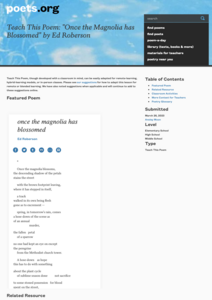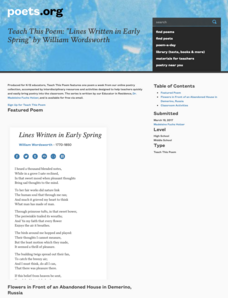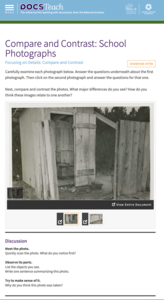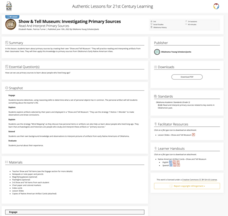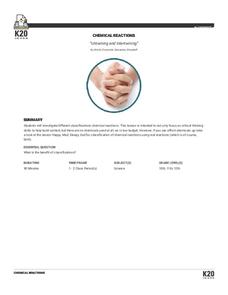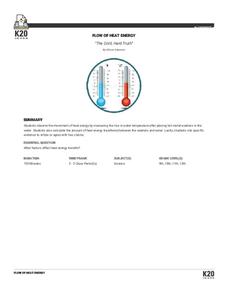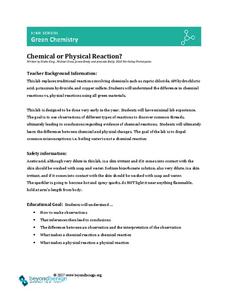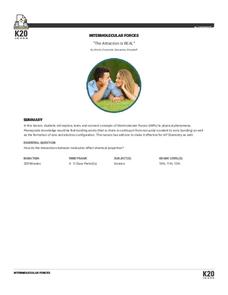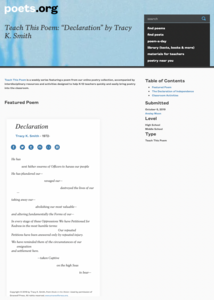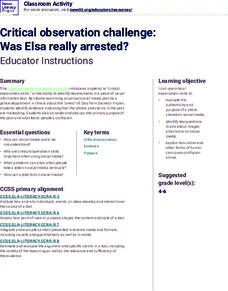Academy of American Poets
Teach This Poem: "somewhere i have never travelled,gladly beyond" by E. E. Cummings
Scholars engage in a role-play exercise, compare their demonstration to a time-lapse video, and to a poem by E.E. Cummings. The ensuing discussion asks learners to consider the similarities among the three.
Academy of American Poets
Teach This Poem: "Once the Magnolia has Blossomed" by Ed Roberson
A free write, an image of magnolia leaves, and the Ed Roberson's poem "Once the Magnolia has Blossomed" ask scholars to use their noticing skills to reflect on the lesson beauty teaches about loss and grief.
Academy of American Poets
Teach This Poem: "Lines Written in Early Spring" by William Wordsworth
William Wordsworth's poem "Lines Written in Early Spring" lets learners sharpen their observation skills. Class members first closely examine the image "Flowers in Front of an Abandoned House in Demerino, Russia," listing what they...
University of Minnesota
Manduca sexta: Caterpillar Dissection
Caterpillars have an amazing, yet tough job to perform in their short lives — eat much, avoid predators, and try not to let all those comments about being the unattractive stage of the life cycle get to them. How do they handle it all?...
Curated OER
Open Inquiry Using C. elegans
Ever wondered what motivates a roundworm? Introduce your biology class to C. elegans, a non-parasitic model organism that can help them understand behavioral stimuli. Paired pupils design an experiment to test the worm's reaction to...
PBS
Explore Art and Movement Inspired by Jacob Lawrence’s Migration Series
Panel 58 from Jacob Lawrence's "Migration Series" of paintings provides middle schoolers with an opportunity to sharpen their observation and analytical skills. After engaging in a warm-up activity that introduces the concepts of...
DocsTeach
Compare and Contrast: School Photographs
Separate and very unequal! An interactive presents learners with two images: a photograph of a boys' bathroom at a school in Gloucester County, Virginia, and a second of a girls' bathroom at a different school in the same county. The...
Curated OER
Go Fish!
So much science in one tiny fish! Introduce young biologists to the zebrafish, a common aquarium inhabitant. The small, unassuming organism presents an opportunity for learners to study habituation using an easy-to-care-for species. Lab...
Curated OER
Fishy Behavior
Here's a lab that may make you rethink that morning cup of coffee. Biology scholars test the effects of caffeine, alcohol, and nicotine on the behavior of zebrafish through an intriguing experiment. Learners observe fish...
K20 LEARN
Show and Tell Museum - Investigating Primary Sources: Read and Interpret Primary Sources
Scholars become detectives in a lesson that focuses on primary sources. Learners practice their observational skills by examining the teacher's artifact and visiting the Show and Tell Museum that highlihgts items from peers and...
K20 LEARN
Allotment in Indian Territory: Land Openings in Indian Territory
To understand how the allotment policy embedded in the Dawes Act, passed by the U.S. government in 1887, affected the tribal sovereignty of Native Americans, young historians examine various maps and documents and Supreme Court...
K20 LEARN
The Eyes of Dr. T. J. Eckleburg: The Great Gatsby and the Sense of Sight
To conclude a study of The Great Gatsby, class members create a multimodal project that represents what they feel the eyes of Dr. T.J. Eckleburg see about the hidden side of one of the characters in F. Scott Fitzgerald's classic...
Learning for Justice
Looking Closely at Ourselves
A thoughtful discussion about self-reflecting leads to a conversation about skin color and making a list of words associated with "beauty." Budding artists use a mirror to examine their features and create a self-portrait. Peers critique...
K20 LEARN
Untwining And Intertwining: Chemical Reactions
What happened when the chemistry teacher told a bad joke? There was no reaction! A creative take on the traditional reaction types lesson invites learners to draw their own conclusions about how compounds and elements combine. Groups...
K20 LEARN
The Cold, Hard Truth
Things are really getting heated in the lab! Science scholars scope out the facts about heat energy transfer using a simple lab from the K20 Center. Groups collaborate to observe temperature changes between hot metal and water, then use...
K20 LEARN
Shanking A Shark: Shark Dissection
Sharks are so cool, they have their own week! Take young zoologists on a journey into one of the most amazing creatures on the planet. A lesson plan the from K20 Center engages them in a full dissection. After the lab, participants...
K20 LEARN
Speedy Cat: Enzymes
Enzymes have a need for speed! What happens when they are forced to slow down? A well-rounded lesson plan from the K20 Center examines enzyme activity through role playing and a lab. Biology scholars work in teams and pairs to understand...
K20 LEARN
Water We Going To Do? Floodplains And Watershed Management
How has human activity affected Earth's watersheds? An action-packed lesson plan, part of the K20 Center, examines water's ability to go with the flow regardless of what is in its path. Scholars build model watersheds, examine time-lapse...
Overcoming Obstacles
Understanding Nonverbal Messages
The Overcoming Obstacles course for middle schoolers continues with a unit module on communication. In the first lesson, participants engage in a series of activities that help them recognize nonverbal clues and the importance of making...
Beyond Benign
Chemical or Physical Reaction?
Ready to take your chemistry class on its first big lab adventure? Dive in to differentiation between chemical and physical changes with a thoughtfully designed set of experiments! Partners conduct a series of reactions, describe their...
K20 LEARN
The Attraction is REAL
How attractive is your intermolecular forces lesson plan? Draw your class in with an activity that includes research, presentation, and demonstrations. Chemistry scholars work together to create claims about the each intermolecular...
Academy of American Poets
Teach This Poem: “Declaration” by Tracy K. Smith
Tracy K. Smith's erasure poem "Declaration" challenges scholars to use their noticing skills to make connections between an engraving entitled "The Declaration of Independence" and Smith's poem. Class members record observations and...
Bonneville
Making Observations and Recording Data for Solar Powered Water Pumping
Get pumped about an activity with water pumps. The fifth of seven installments in the Understanding Science and Engineering unit has pupils learn how to make observations, record data, and create data displays. Each group measures the...
News Literacy Project
Critical Observation Challenge: Was Elsa Really Arrested?
A 14-slide presentation showcases a social media post featuring Disney's Elsa from the movie, Frozen. The seemingly harmless post received lots of attention, raising the question, how do we know posts are factual? Scholars go through...



